An Interview With Michael Eager About the Unlikely Events that Led His Family to Come to Ajijic in the First Place and Then to Become a Central Part of Ajijic History
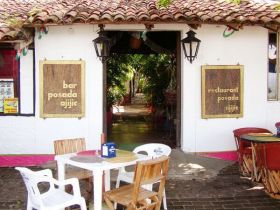 Editor’s note: We had the privilege in early March, 2017 to talk with Michael Eager. The Eager family is a bit of an institution in the Ajijic area, where Michael’s brother Mark owns a real estate sales company and Michael runs the business that started it all in the 1970s, formerly the Posada, and now the Nueva Posada. In this interview, Michael tells us the unlikely set of events that started it all when Ajijic was just a small, out of the way village and well before almost anyone in the US or Canada had ever heard of it.
Editor’s note: We had the privilege in early March, 2017 to talk with Michael Eager. The Eager family is a bit of an institution in the Ajijic area, where Michael’s brother Mark owns a real estate sales company and Michael runs the business that started it all in the 1970s, formerly the Posada, and now the Nueva Posada. In this interview, Michael tells us the unlikely set of events that started it all when Ajijic was just a small, out of the way village and well before almost anyone in the US or Canada had ever heard of it. CB (Chuck Bolotin, of Best Places in the World to Retire): We’re having lunch in Ajijic, well known expat destination on the shores of Lake Chapala, in the Mexican state of Jalisco, about an hour south of Guadalajara. We’re on the terrace of the famed Nueva Posada, underneath a 100 year old rubber tree, looking out over the lake. It is a beautiful, sophisticated, timeless setting, but it probably wasn’t like this when your parents first came. Please tell us the family lore. What caused them to come here?
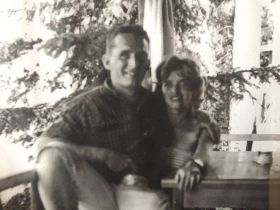
Michael Eager: In the 1970s my dad was a national sales manager from Miles Laboratories, the company that manufactures Alka-Seltzer and Flintstone's One-A-Day vitamins. He would travel all across the States and Canada. This pre- dates the airline frequent mile plans.
In order to show their appreciation for all the miles he had flown, one day, one of the corporate people from one of the airlines said, “Mr. Eager, we’ve opened a new leg into Guadalajara and we’re selecting some of our best customers to give away two free tickets.”
So my mom and dad got these two free tickets to go to Guadalajara from Toronto on the inaugural flight in 1974. They were to stay for 15 days.
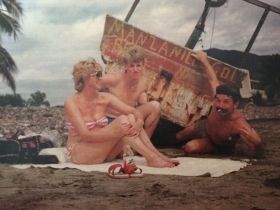
CB: How old were you?
Michael Eager: I guess I may have been 17 at that time. My sister was 16 and my brother Mark was 14. We were supposedly taking care of the house but were partying every day my parents were away. We even managed to crash my dad’s corporate car.
When my parents arrived in Guadalajara, they got a driver to take them to a hotel called the Camino Real which was this big fancy corporate hotel. My dad walked into the lobby and immediately didn’t like it. He said, “I always stay in this type of hotel when I’m on business.”
And so the next day he got up and said, “No, we’re not going to stay here.”
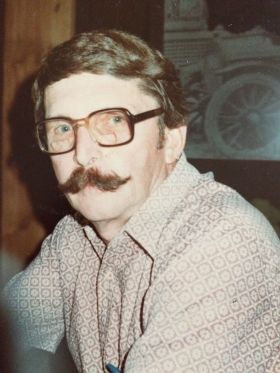 He talked to another driver, who was a guy who worked outside the lobby of the hotel and said, “I want to go to a little Mexican village.”
He talked to another driver, who was a guy who worked outside the lobby of the hotel and said, “I want to go to a little Mexican village.” So the driver said, “I know the perfect spot. There’s a place where a lot of Gringos go, expats. It’s a fishing village where there’s a lot of people who paint, who are artists.” My mom painted so my dad said, “Oh, let’s go there.”
The driver brought my mom and dad to this village, Ajijic, and then he took them to the Hotel Real in Chapala, which was part of the same corporate chain of the place my parents stayed in Guadalajara. Just like in Guadalajara, they checked in, spent the night there, and my dad said, “This is another big fancy hotel. I can’t stay here.”
My father found another driver and said, “Take me to the village.”
Ajijic was a lot smaller then than what it is today. And first they went to the plaza, where my dad asked the driver, “Is there any place where I can stay here in the village?” And the guy said, “Oh yeah, there’s an inn. It’s called the Posada.”
“Posasda” literally means “inn.” And so he brought my mom and dad down to this little inn that was on the lakeshore, right in the middle of the village, right where the pier was. The moment my mom and dad got out of the cab, there was this beautiful slate rock wall, and a beautiful building. There was this tall, beautiful wooden door.
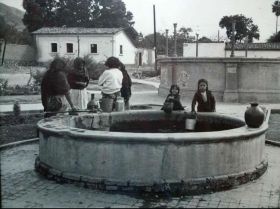
The door was open, so they looked into an inner courtyard with a 150 or 200 year old great pine. The trunk of the great pine had to be 24 inches in diameter and it was all up on an arbor made of a grape vine. My mom and dad walked in to where there were all these little rooms around the courtyard.
They knew they were in the right place from the moment they came into the building. They stepped into the courtyard, where there was this little hallway off to the left, and went through, into this beautiful natural garden with bougainvillea, palm trees, fichus trees, and exotic fruit trees. As they wandered around the garden, there was a pool in the middle and all these little bungalows around the outskirts of the perimeter walls. It was like heaven.
They went down to the restaurant bar that faced onto the lake and my dad said, “This is where we’re going to stay for the rest of our trip; here in Ajijic.” So they went back, picked up their luggage, came to the hotel, and checked in. At that time they were probably paying $8 to $10 a night to stay there.
.jpg) CB: How did they enjoy their time at the Posada?
CB: How did they enjoy their time at the Posada? While there, my dad could see that the place was terribly mismanaged. He always had a good eye for business and my family had been in the hospitality industry with my grandparents on Vancouver Island in a hotel called Timberlodge. So my dad had knowledge of the industry and he always wanted to get back into the hospitality business.
Over the rest of the two week period, my dad was analyzing what was going on. He could see that the poor lady who owned and operated the business was literally “blotto” by the afternoon. She would get so drunk, they had to pick her up in her equipale (a Mexican pigskin chair), that she always sat in at the bar, take her to her room and just dump her into bed. The management was so poor that it was amazing that the place was even operating.
My dad could see that some of the staff had their fingers in the till and all this was going on right under his nose. He knew he couldn’t talk to the lady, so he stuck up a friendship with a guy named Nacho who sold jewelry in the garden just like that man over there who’s selling jewelry here now. He asked Nacho what family owned the property, and lots of other questions about how everything worked.
Nacho spoke really good English, which was good because my dad didn’t speak any Spanish. Nacho was sort of the man who planted the seed in my dad’s mind that the Posada would be a right place for my dad to operate. Nacho told my dad that the name 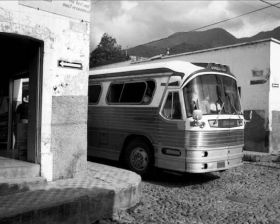 of the little old lady who owned the property was Josefina Ramirez, who must have been in her 70s.
of the little old lady who owned the property was Josefina Ramirez, who must have been in her 70s.
 of the little old lady who owned the property was Josefina Ramirez, who must have been in her 70s.
of the little old lady who owned the property was Josefina Ramirez, who must have been in her 70s. Before leaving to fly back home, my dad left his business card with Nacho the jewelry salesman and said, “If you ever see Dona Josefina give her my card and tell her I’d be extremely interested in buying this place, but if not, I’ll rent it.”
So my mom and dad went back to Canada and repaired the car damage and the damage to the house after my brother, sister and I had trashed it.
CB: How long was it before something happened?
Michael Eager: Maybe eight months had gone by and all of a sudden a telegram came from Mexico. “Come. La Posada is available for rent. We don’t want to sell it but if you want to rent it, it’s available.”
My dad’s mind just exploded. So he started planning. He put the house on the market along with all the family heirlooms.
.jpg) CB: He did all this without even going back to Ajijic first or making the deal?
CB: He did all this without even going back to Ajijic first or making the deal? Michael Eager: No, it never crossed his mind to get on a plane and see what he was getting. He sold everything.
Remember those old Ford station wagons with the simulated wood down the sides?
CB: Yes.
Michael Eager: My dad was always kind of weird so he had this trailer built to pull behind the station wagon. He had to everything special so he had our trailer painted blue with white polka dots, because the station wagon was blue.
I was just getting started in university, so I didn’t go. After selling the home and everything, my parents loaded my brother and sister, Mark and Judy, into the station wagon and loaded the trailer up with whatever they felt that they had to have and started on their trip.
.jpg)
CB: What happened on their trip?
Michael Eager: They probably spent a month and a half on the road. They took the kids to all the places they wanted to go. Orlando and New Orleans, Dallas, and Houston. They had this great trip and finally made it to the border.
They crossed at Laredo and went south to Monterrey, where the wheel fell of the trailer. Boom! The hub of the trailer scratched the road surface. Since my mom and dad and the kids were these greenhorns from Canada, when the federal cop pulled up and started humming and hawing about the damage to the road, it never crossed my dad’s mind to bribe this guy. As a result, they ended up having to spend days in Monterrey where my dad was eventually taken before the judge and had to pay for the damages to the highway.
CB: Your dad was pretty unprepared and not very knowledgeable about how to deal with issues like this back then.
.jpg)
Michael Eager: No other course of action ever occurred to him. But that should have been the omen. “Go back, Mr. Eager. Go back.” My dad’s name was Morley. “Go back to Canada, Morley.”
But he didn’t, and my mom always followed my dad blindly. Anything he wanted to do she said, “Okay, let’s do it, Morley.”
CB: What happened when they finally got to Ajijic?
Michael Eager: They continued on their trip and came down to Ajijic, pulled up to that beautiful wooden door I was talking about, parked in front of the old Posada and he expected to spend his first night there.
But the doors were closed and there was garbage in the street. Junk was all over the place. There was tape across the door that said the word “cerrado,” which in this case meant “bankruptcy.”
My dad wasn’t able to get ahold of the little old lady on the property, but he did manage to talk to her son, who was a doctor in Guadalajara. The son explained everything that happened. The lady who was running the property when my dad and mom stayed there had been taken out of the country in the middle of the night and sent back to the US maybe a month after my mom and dad had been there.
.jpg)
CB: Why was she taken out of the country?
Michael Eager: She had to leave to the country because she was unable to manage the Posada. She owed money to the local government and all of her suppliers, one named Fernando who was sort of the mafia top dog. So between Fernando, the local government and all the suppliers and employees, they stripped the building. Nothing, there was nothing there. Toilet bowls were pulled up from the floor, sinks were pulled out of the wall, hot water heaters were taken, water pumps, the compressor for the cold; nothing, there was nothing there. That beautiful garden that my mom and dad had seen when they stayed before had been taken over by bamboo. The garden was trash.
My parents just sat down and cried. They thought, “What have we brought our family to?”
.jpg) But my dad had nothing to go back to, so there again, they decided, “Well, let’s take a kick at the can.” They spent what little money they had from selling everything they had in Canada in the time it took just to get the place up to standard.
But my dad had nothing to go back to, so there again, they decided, “Well, let’s take a kick at the can.” They spent what little money they had from selling everything they had in Canada in the time it took just to get the place up to standard. CB: How did they get the rights to manage it?
Michael Eager: My dad had to pay off some of the debt, but not all of it. The family owned the property, so they helped with some of it. My dad was able to get in and get the place running, but it took them maybe 3 to 4 months actually to get enough rooms ready.
They started with maybe 4 rooms. When they opened the restaurant all they had to serve was a soup, sandwich, they had one bottle of rum, one bottle of vodka, one bottle of gin, and a case of mix. That’s how they got started. So they had a soup of the day, the drink of the day, and four places for people to stay. My mom and dad lived in one of the units with my brother and sister and then they started hiring staff.
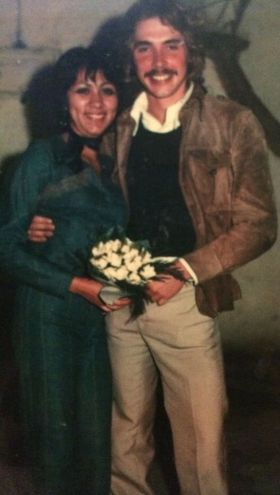
CB: When did you first come down to Ajijic?
Michael Eager: Fortunately, I came down during spring break, when I met a girl at a quinceañera, fell madly in love with her, and we married.
After we got married, my wife was the one who opened our eyes to everything that was going on wrong. My family believed in everybody and we didn’t know we were getting ripped off by the cashier, we were getting ripped off by the girl in reception, and the bartender was ripping us off, because they had these gullible Gringos. The moment my wife came into my life and started helping me, working by my side, that’s the moment we were able to turn things around.
CB: How long were you at the old Pasada?
Michael Eager: We were there at the old Posada for 15 years, but we were always on the point of bankruptcy because there was always one thing or another happening. It was a period of turmoil In Mexico during that time. There were devaluations and hyperinflations and then one Mexican president made all these terrible anti-Jewish comments, which caused American travelers to stop coming. That was during Lopez Portillo. So there we were; it was either feast or famine.
CB: What was it like to live in Ajijic then?
Michael Eager: At that time we didn’t have telephones. People who wanted to reserve a room had to do it via writing letters. If someone wanted to use the phone, we had a phone office in the plaza. If a person called, a guy from the phone office would send a runner down to the hotel, and then would have to run back to the phone booth. That was our only form of communication.
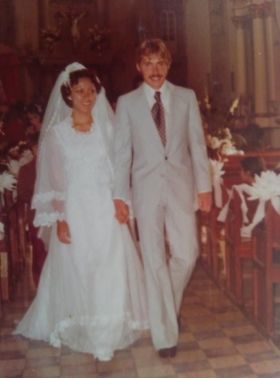 At that time, there was basically no TV. There were maybe only three or four phones in the village. It was beautiful. I really miss those times. Most of the people who lived here were real characters. They were from an artistic background or we had a lot of military retirees because that’s how the old Posada got its kickoff. Before we ran it, It was a distillery where they made tequila. It was a gold mill where they separated gold from ore. It was a place where they made tortillas.
At that time, there was basically no TV. There were maybe only three or four phones in the village. It was beautiful. I really miss those times. Most of the people who lived here were real characters. They were from an artistic background or we had a lot of military retirees because that’s how the old Posada got its kickoff. Before we ran it, It was a distillery where they made tequila. It was a gold mill where they separated gold from ore. It was a place where they made tortillas. They used to take the corn and the kernels of the corn and put them in water to soak overnight and then the next day they took it to a grist mill where they would grind it. That’s how they make the masa, and that’s what they had on the premises of the old Posada. For years the old Posada was the main building in the village. It had all these different careers.
It wasn’t until after the Second World War that a retired vet came down and approached Dona Josefina about turning it into a hotel. He was the one who started advertising to vets from the United States who had a fixed income to come down to Ajijic and he would set them up with a bungalow and anything they wanted. I can’t remember how much he charged, but it was a fixed amount and you would get a room and board, anything; I mean, anything. Like if the retired vet needed female companionship, that would be supplied.
CB: It’s interesting you say that, because I believe that now, there are many more retired women in Ajijic than retired men.
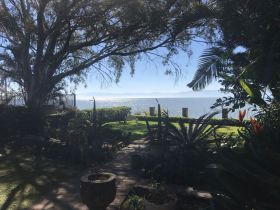 Michael Eager: Yes. At that time the tourism we were getting was basically all male. Many of them were retired soldiers.
Michael Eager: Yes. At that time the tourism we were getting was basically all male. Many of them were retired soldiers. CB: Did you have like gambling? It sounds a bit like how Las Vegas got started.
Michael Eager: No, we didn’t have gambling, but gambling was a part of our early history at the Posada.
My dad and this other fellow by the name of Ted who started Barber’s Bazaar (a consignment shop), wanted to help a local orphanage. Ted said to my dad, “You know what, a way to raise money for this orphanage is to start bingo games.”
And so we started having bingo games. We had this empty hall in the premises of the old Posada where we could seat maybe 60 to 70 people to play bingo. Ted happened to have the bingo wheel and the bingo balls and all the other stuff. We had all the cards made up so one day a week, I think it was on Thursdays, we would have Bingo Day and all of the profits went to the charity.
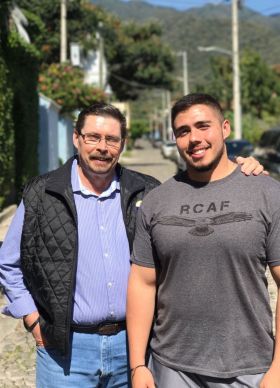
We were doing that for maybe four months and everything went great raising a lot of money for the charity. I guess there was a disgruntled bingo player who reported us to the immigration department by saying that on the premises of the old Posada we were running illegal gambling. At that time in Mexico gambling was illegal.
A SWAT Team ascended on the grounds of the old Posada on Bingo Day. All these guys with bulletproof vests and with their machine guns and this room full of 60 or 70 elderly little old men and little old ladies. Everybody had to go back to their homes, get their tourist visas or their permanent residence cards to prove that they weren’t illegally in the country.
The only people who were illegal were my mom, dad, and I. We never had working papers because for the first three years when we were in Mexico, we were constantly being lied to by the lawyers. And so we were hauled off. My dad and I were handcuffed, taken to the Palacio Federal and thrown in the basement jail. It wasn’t until the next day that we were able to get an appointment to see the head delegate for the immigration department, who asked us to tell him our story.
We told him what happened and the fact that by that time we had 25 people on staff, so he took pity on us. He picked up the phone and called someone. Then he told us that in two weeks we would have our working visa. And sure enough, two weeks later we got a telegram from Mexico City and we’re still here to this day.
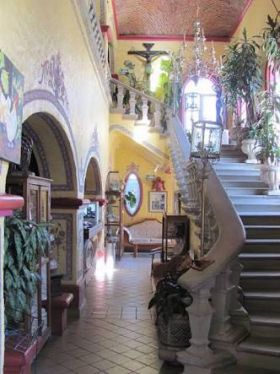
CB: What year was the bingo incident?
Michael Eager: That would have been around ’78.
CB: It wasn’t that long after you got here. So you were married at this point?
Michael Eager: Yes, I was married in ’77.
CB: Were your brother and sister was still here?
Michael Eager: Yup, my brother and sister were still here. Mexico wasn’t good for my sister, though. For my brother and I it was great because we were young men, and the freedom that we had was unbelievable. We could do whatever we wanted. We could drink. We could cavort. I did all kinds of things. I’ve ridden bulls, done rodeos. Anything I wanted to do I could do it. There were no limits.
It was different for my sister because she was this young girl from a liberal upbringing so it was terrible for her. It was different because we were living in this supposed macho society and so she couldn’t have male friends. Eventually, she ended up going back to Canada.
CB: How long were you at the old Posada?
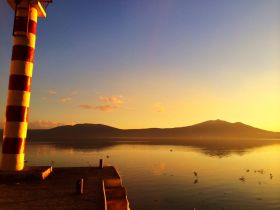 Michael Eager: We started there in 1975 and ran it to about 1990. We had this great relationship with the little old lady who owned it, Dona Josefina, who said, “All I want is a $1,000 a month rent. I don’t care what happens. I don’t want to hear any problems. You just give me $1,000 a month and it’s yours. You can do whatever you want with it.”
Michael Eager: We started there in 1975 and ran it to about 1990. We had this great relationship with the little old lady who owned it, Dona Josefina, who said, “All I want is a $1,000 a month rent. I don’t care what happens. I don’t want to hear any problems. You just give me $1,000 a month and it’s yours. You can do whatever you want with it.” Since it was this old falling down hacienda, we spent that much money just maintaining it. But we always paid the $1,000 a month. And then in ’85 she passed away. The rent and conditions eventually changed so that it was becoming very difficult for us to stay there.
In the meantime, I started building here, where we now have the Nuevo (New) Posada, because we already bought this property. There was nothing here and the idea was to build my family home here. We just lucked out. I’ve always felt since I married my wife that there’s been her angel watching over me, and everything is always falling into place. While we still ran the old Posada, we were able to build the core of what we had here, so we eventually moved the Posada here.
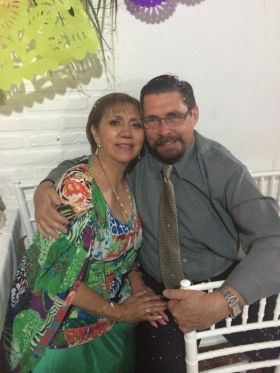 It saddens me to see what happened to the old Posada property because nobody’s really been able to make it successful. We ran it for 15 years and it was the local watering hole. There were no other restaurants, there were no other bars, and there were no other hotels, so if you wanted to know what was going on in the world you would go down to the old Posada and talk to some of the new hotel guests to find out what’s going on in the States or what was going on in Canada. Either that, or you would listen to my father giving his idea of the ideal world.
It saddens me to see what happened to the old Posada property because nobody’s really been able to make it successful. We ran it for 15 years and it was the local watering hole. There were no other restaurants, there were no other bars, and there were no other hotels, so if you wanted to know what was going on in the world you would go down to the old Posada and talk to some of the new hotel guests to find out what’s going on in the States or what was going on in Canada. Either that, or you would listen to my father giving his idea of the ideal world. My dad was great at starting rumors in this little community, which he would do on purpose for his own amusement. The rumor would go through the Gringo Grapevine like wildfire and he would see how embellished it would be by the time he heard it again.
The old Posada was a great place, filled with lots of good memories and lots of bad memories. I lived on the premises there basically the whole time. Three of my children were conceived on the premises. It’s a place that I have fun memories of, but still to this day I can’t go back into the property. I can walk by because I live nearby, but I can’t go into the property. I have this mind block. I have this idea of going forward and I don’t like to go back. Since I left there in 1990 and opened here, I haven’t been back. When the newcomers go in and try to “take a hit at the can” and get the place up and operating they always invite me to the inaugural fiesta. I just tell them I can’t go.
Photos, from top:
- Old Posada
- Morley and Judy Eager, Michael’s parents
- Michael Eager’s mother Judy, father Morley and brother Mark, on vacation in Manzanillo
- Morley Eager
- Pictures from Ajijic in the 1940s – 1950s
- Michael Eager and Maria Elena while dating
- Michael Eager and Maria Elena getting married
- View from present day Nueva Posada
- Michael Eager with son, Johnny, on the street in front of Nueva Posada
- Interior stairway at Nueva Posada
- View of Lake Chapala
- Present day photo of Michael and Maria Elena Eager, Ajijic, Mexico



.png)